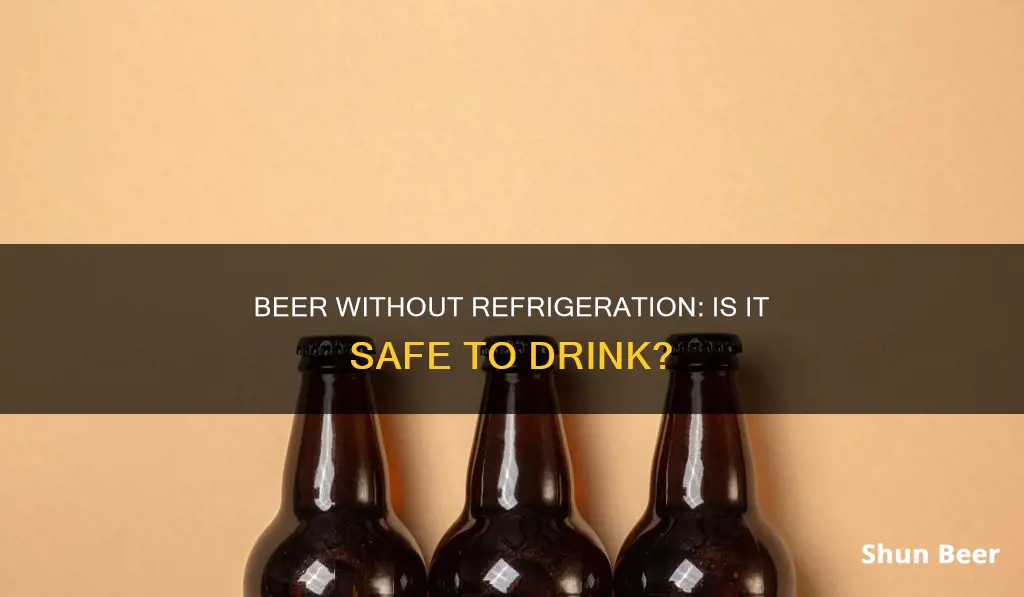
Beer is a beverage that requires special handling to maintain its taste, aroma, carbonation level, and appearance. While drinking warm beer is not hazardous to most people, it can undergo undesirable changes if not properly stored. Beer that has not been refrigerated can last for about 5 to 9 months beyond the expiration date. However, it is important to note that frequent temperature fluctuations, extreme heat, and direct sunlight can negatively affect the quality of the beer. Therefore, it is recommended to store beer in a cool, dark, and consistent temperature environment to maintain its freshness and quality.
What You'll Learn
- Beer can be left unrefrigerated for a few hours without spoiling
- Beer should be stored in a cool, dry place
- Beer should be consumed before the expiration date
- Beer can be stored in a refrigerator for up to two or three years
- Beer can be safely consumed after the expiration date but may have an unpleasant taste

Beer can be left unrefrigerated for a few hours without spoiling
If you've just received a beer delivery and don't have enough space in the fridge, don't worry. The beer will be fine if you leave it at room temperature in your home. Avoid storing it in a hot garage or out in the sun, though, as extreme heat can ruin beer.
It's also worth noting that frequent temperature fluctuations can accelerate staling and quality decay. So, while it's okay to leave beer unrefrigerated for a short period, it's best to avoid constantly changing its temperature.
Additionally, the type of beer can affect its shelf life. Stronger beers, such as stouts and porters, tend to last longer than lighter beers like lagers and pilsners. IPAs, for example, are best consumed fresh to enjoy their full flavor and aroma.
Beer and Drug Testing: What's the Verdict?
You may want to see also

Beer should be stored in a cool, dry place
Beer is best stored in a cool, dry place. While refrigeration is ideal, it is not always necessary. Beer has been shipped, stored, and transported at room temperature for years, so a short stint at room temperature won't ruin your beer. However, keeping beer in a cool, dry place will help prolong its life and maintain its freshness.
The ideal temperature range for storing beer is between 50 and 55 degrees Fahrenheit, known as "cellar temperature." This temperature range will help prevent flavour loss and ensure your beer tastes as it should. A dedicated beer fridge can be set to this temperature range, providing the perfect storage conditions for your beer.
If you don't have access to a beer fridge, a basement or cellar is a good alternative, as these areas tend to be relatively cool and dark. Keeping beer in a dark place is crucial, as light is the number one cause of "skunky" beer. Brown bottles offer some protection against light, but clear bottles do not provide any protection, and even brown bottles are best kept in the dark.
It's also important to store beer upright, as this minimises the amount of the beer's surface area that will be in contact with the air. Keeping beer upright also helps prevent sediment from settling at the bottom of the bottle and affecting the flavour.
While beer can be stored at room temperature, it's important to note that this is not ideal for long-term storage. Beer is an organic product and begins to decay as soon as it's brewed. Heat speeds up this process, leading to off-flavours and smells. Therefore, it's best to keep beer in a cool, dry place to prolong its freshness and maintain optimal drinking conditions.
In summary, while beer can be stored at room temperature in the short term, for long-term storage, it's best to keep it in a cool, dry place, such as a basement or cellar, to prolong its freshness and maintain optimal drinking conditions.
CBD Oil and Beer: Is It Safe?
You may want to see also

Beer should be consumed before the expiration date
Beer is one of the oldest alcoholic drinks in the world and is widely consumed. It is produced with expiry dates, but these are more of a guideline on quality than safety. A typical lager will be drinkable 6–24 months after its best-before date if it has been kept in the fridge, and for up to 9 months if it hasn't been refrigerated. However, IPAs, especially the hoppy ones, lose their flavour and aroma over time and are best consumed sooner.
Beer is best stored cold and will last longer if stored at a steady cool temperature. Beer that has been refrigerated can be allowed to warm up and then be refrigerated again without spoilage. However, it is important to avoid extreme temperature fluctuations and direct sunlight, as these can affect the flavour and quality of the beer. Additionally, quick temperature changes can negatively impact the beer's long-term stability.
It is recommended to consume beer before the expiration date to ensure optimal flavour and quality. Proper storage conditions, such as keeping the beer refrigerated or in a cool, dry place, can help extend its shelf life.
Drinking Beer and Driving: What's the Legal Limit?
You may want to see also

Beer can be stored in a refrigerator for up to two or three years
Beer is a beverage that requires some special handling to keep it safe and tasty to drink. While drinking a warm beer is not hazardous to your health, it can cause degradation in taste, aroma, carbonation level, and appearance. Warm storage temperatures speed up these undesirable changes.
If you have bought refrigerated beer and do not have enough space in your fridge, you can let it warm up and then refrigerate it again later without ruining the beer. However, it is important to avoid extreme temperature fluctuations and direct sunlight, as these can negatively impact the beer.
Overall, while drinking a warm beer is generally safe, storing beer in a refrigerator at a consistent temperature is the best way to ensure its quality and freshness.
Misoprostol and Beer: A Safe Mix?
You may want to see also

Beer can be safely consumed after the expiration date but may have an unpleasant taste
Beer can be safely consumed after its expiration date, but it may have an unpleasant taste. Beer is produced with expiry dates, but these are more of a guideline on quality rather than safety. While the beer will be safe to drink, it may have started to lose its quality and will likely have an unpleasant taste and aroma. Beer can last about 5 to 9 months beyond its expiration date if kept at room temperature, and up to 2 or 3 years if refrigerated. However, opened beer has a shelf life of only about a day, regardless of whether it has expired.
Proper storage is key to maintaining the quality of beer. Beer should be purchased from the coolest area of the store and transported in insulated bags or wraps. It should then be refrigerated immediately upon arriving home and kept away from light. Frequent temperature fluctuations should be avoided, and beer should be kept in the main compartment of the refrigerator, not on the door. Beer should also be kept refrigerated until serving and only removed from refrigeration right before drinking.
While drinking a warm beer is generally not hazardous to one's health, there are a few factors that determine how prone a warm beer would be to harbouring harmful microbes. These include alcohol content, ingredients, and time since brewing. Beer with higher alcohol by volume (ABV) is less likely to grow pathogens, and most beers fall within a range that inhibits microbial growth to an extent. However, unpasteurised, unfiltered beers and those with fruit additions have a higher risk of spoilage as the living microbes can multiply faster at warmer temperatures. Additionally, older beer is more susceptible to spoilage in warm conditions than recently packaged beer.
There are several signs that indicate a warm beer has spoiled and should not be consumed. These include sour, unpleasant aromas, cloudiness, lack of carbonation, skunky or sunlight flavours, and slime formation. If any of these traits are observed, it is best to dispose of the beer rather than drinking it.
Do LCBO Gift Cards Work at Beer Store?
You may want to see also
Frequently asked questions
Drinking a warm beer is not hazardous to your health, but it may not taste as good. Beer that hasn't been refrigerated may have a degradation in taste, aroma, carbonation level, and appearance.
Beer can be left unrefrigerated for around 4 hours at temperatures between 35°F and 55°F. If the temperature is over 90°F, it is best to refrigerate the beer after 1-2 hours.
Yes, you can put beer that hasn't been refrigerated into the fridge. It is a myth that something bad will happen to the beer if it is cooled down again. However, it is best to avoid extreme temperature fluctuations, such as from freezing to over 100°F.







